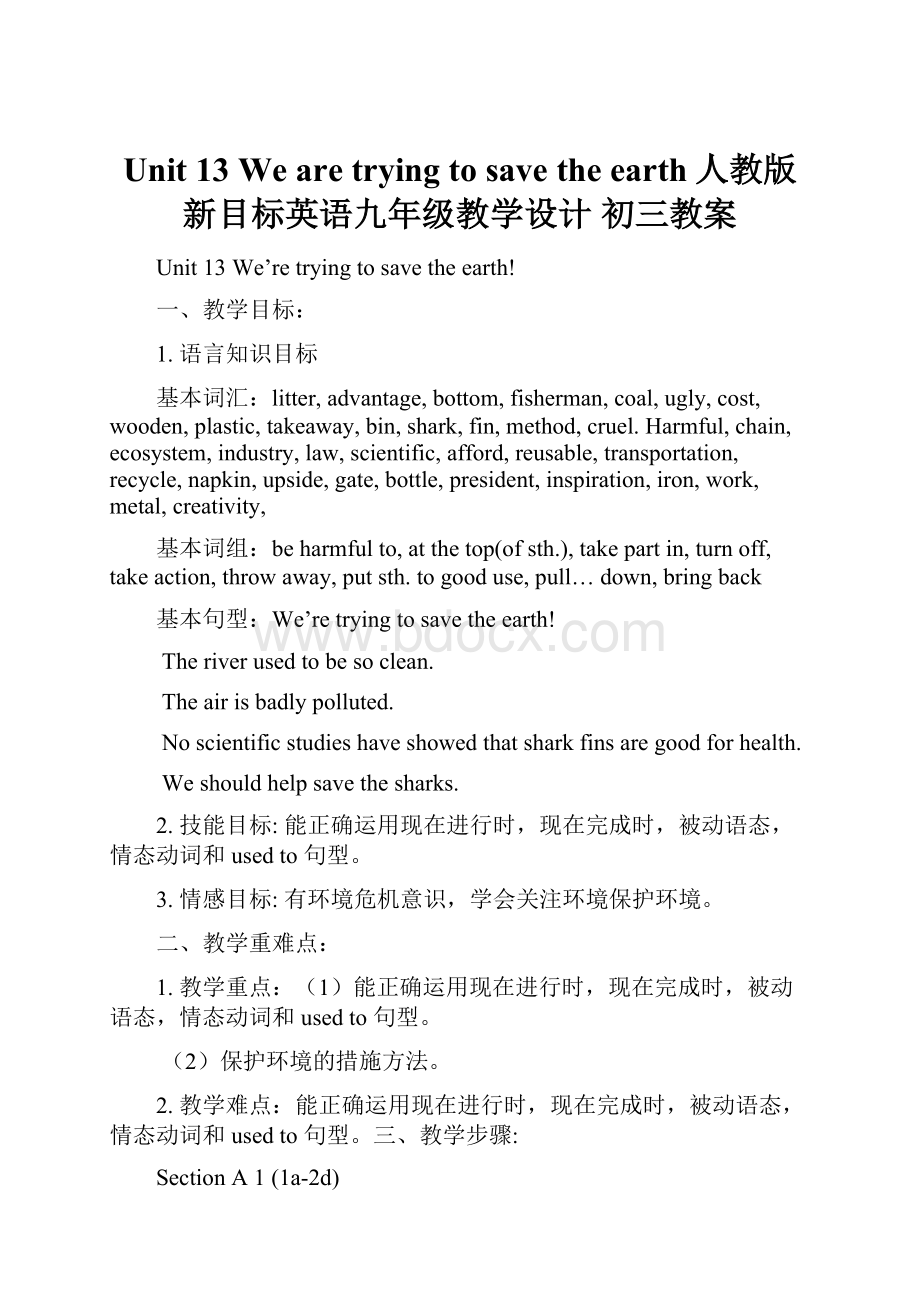Unit 13 We are trying to save the earth人教版新目标英语九年级教学设计 初三教案.docx
《Unit 13 We are trying to save the earth人教版新目标英语九年级教学设计 初三教案.docx》由会员分享,可在线阅读,更多相关《Unit 13 We are trying to save the earth人教版新目标英语九年级教学设计 初三教案.docx(31页珍藏版)》请在冰豆网上搜索。

Unit13Wearetryingtosavetheearth人教版新目标英语九年级教学设计初三教案
Unit13We’retryingtosavetheearth!
一、教学目标:
1.语言知识目标
基本词汇:
litter,advantage,bottom,fisherman,coal,ugly,cost,wooden,plastic,takeaway,bin,shark,fin,method,cruel.Harmful,chain,ecosystem,industry,law,scientific,afford,reusable,transportation,recycle,napkin,upside,gate,bottle,president,inspiration,iron,work,metal,creativity,
基本词组:
beharmfulto,atthetop(ofsth.),takepartin,turnoff,takeaction,throwaway,putsth.togooduse,pull…down,bringback
基本句型:
We’retryingtosavetheearth!
Theriverusedtobesoclean.
Theairisbadlypolluted.
Noscientificstudieshaveshowedthatsharkfinsaregoodforhealth.
Weshouldhelpsavethesharks.
2.技能目标:
能正确运用现在进行时,现在完成时,被动语态,情态动词和usedto句型。
3.情感目标:
有环境危机意识,学会关注环境保护环境。
二、教学重难点:
1.教学重点:
(1)能正确运用现在进行时,现在完成时,被动语态,情态动词和usedto句型。
(2)保护环境的措施方法。
2.教学难点:
能正确运用现在进行时,现在完成时,被动语态,情态动词和usedto句型。
三、教学步骤:
SectionA1(1a-2d)
I.Presentation
Showthepictureoftheearthandtellstudentstheearthispollutednow.
Forexample:
(1)Thefactoriesthatburncoalpollutetheairwithalotofblacksmoke.
(2)Factoriesputwasteintotheriver.
(3)Peopleshouldthrowawaylitterinthebin.
(4)Therearemorecarsontheroad.
II.Learning
Herearesomewordsrelatedtodifferentkindsofpollution.Writethemintheboxbelow.Thenaddmorewords.
loudmusiccarsrubbishplaneslitteringshipsfactoriessmokingbuildinghousesmobilephones
noisepollutionairpollutionwaterpollution
____________________________________
____________________________________
____________________________________
____________________________________
Keys :
noisepollutionloudmusicplanesmobilephonesbuildinghouses
airpollutionfactoriessmokingcarsbuildinghouses
waterpollutionshipsrubbishlitteringfactories
III.Listening
1.1bListenandcompletethesentences.
Whatwastheproblem?
Theriverwas_____________.Eventhebottom(底部)oftheriverwasfullof________.Therewerenomore______forfishermen(渔民)tocatch.
Whatcausedtheproblem?
Peoplearethrowing_______intotheriver.Factoriesareputting______intotheriver.
Howshouldtheproblembesolved?
Weshouldwritetothe____________andaskthemto___________thefactories.Everyoneshouldhelpto__________theriver.
Keys:
reallydirtyrubbishfishlitterwastegovernment
closedowncleanup
2.Listenagainandcheck(√)thesentencesyouhear.
1)Wecouldgofishingintheriver.
2)Theriverwasreallydirty.
3)Theriverhasalwaysbeenthenicestriverinthistown.
4)Weshouldasktheteachersforhelp.
Keys:
23
IV.Practice
1.Role-playtheconversationin1c.
Mark:
Theriverwasdirty.Eventhebottomoftheriverwasfullofrubbish.
Tony:
Butitusedtobesoclean!
Mark:
Yes,butpeoplearethrowinglitterintotheriver.
Tony:
Everyoneinthistownshouldplayapartincleaningitup!
2.Makeconversationsusingthepollutionin1a.
A:
Theriverhasalwaysbeenthenicestriverinthistown.
B:
Yes,itusedtobesoclean.
A:
ButIwastherelastweekendandtheriverwasreallydirty.
B:
Whatcausedtheproblem?
A:
Peoplearethrowinglitterintotheriver.
B:
Whatshouldwedo?
A:
Factoriesarealsoputtingwasteintotheriver.
B:
Yes,everyoneinthistownshouldplayapart.
A:
Weshouldwritetothegovernmentandaskthemtoclosedownthefactories.
B:
Whatelsecanwedo?
A:
Everyoneshouldhelptocleanuptheriver.
V.Languagepoints
1.We’retryingtosavetheearth!
我们正在竭尽全力拯救地球!
trytodo=tryone’sbesttodo努力去做某事。
e.g.Everystudentshouldtrytostudyhardinordertostudyinauniversity.
为了进入大学学习,每个学生都应该努力学习。
2.Herearesomewordsrelatedtodifferentkindsofpollution.
berelatedto与…有关
e.g. Iamnot related to himinanyway.我和他无任何关系。
3.Everyoneinthistownshouldplayapartincleaningitup!
playapartin在……方面起作用
e.g.Agooddietplaysalargepartinhelpingpeoplelivelonger.
健康的饮食在帮助人们长寿方面起着非常大的作用。
playapart在……中扮演角色
e.g.HewasinvitedtoplayapartinthisTVplay.
他被邀请参加这个电视剧的演出。
4.Eventhebottomoftheriverwasfullofrubbish.
Yes,butpeoplearethrowinglitterintotheriver.
litter和rubbish都可指“垃圾”,用作不可数名词。
rubbish指“没用的东西(被扔或将要丢弃的无用的东西)”不可回收。
litter指“(室内或公共场所)乱扔的废物(纸屑、不要的包装纸、废瓶等)”还可回收
e.g.Throwtherubbishout.把垃圾扔出去。
Theroomisfullofrubbish.房间里堆满了垃圾。
Pickupyourlitterafterapicnic.野餐后将废弃物收拾好。
VI.Listening
1.2aListentotheinterview.CirclethekindsofpollutionthatJasonandSusantalkabout.
A.landpollutionB.airpollution
C.noisepollutionD.waterpollution
Keys:
BA
2.2bListenagainandcompletethesentences.
1)Theairisbadlypollutedbecausethereare___________ontheroadthesedays.
2)Factoriesthatburncoalalso________theairwithalotofblacksmoke.
3)Thereisalsotoomuchrubbishandwaste.People_________________thingseveryday.
4)Peoplearealsolitteringin______________likeparks.Thisisturningbeautifulplacesintougly(丑陋)ones.
Keys:
morecarspollutearethrowingawaypublicplaces
3.Listenandanswerthequestions.
1)Whoistheinterviewertalkingto?
2)Whataretheytalking?
3)Whatotherproblemsdotheysee?
Keys:
SusanandJason.
Theenvironmentalproblems.
There’stoomuchrubbishandwasteinthestreets.
VII.Practice(2c)
Usetheinformationin2aand2btorole-playconversationsbetweenJasonandSusan.
Jason:
Theairhasbecomereallypollutedaroundhere.I’mgettingveryworried.
Susan:
Yes,Iusedtobeabletoseestarsinthesky.
Jason:
Theproblemisthat…
VIII.Discussion
Askstudentswhatweshoulddotosavetheearth.Helpstudentsanswer,turnoffthe
lightswhenyouleavearoom;stopridingincars;stopusingpapertowelsornapkins;recyclebooksandpaper.
IX.Reading
1.Read2dandcompletethechart.
Problems
Solvingproblems
airpollution
wastepollution
wooden(木头的)chopsticksorplasticforks
rubbish
2.Role-playtheconversation.
Interviewer:
JasonandSusan,whatareyourideasforsolvingtheseproblems?
Jason:
Well,tocutdownairpollution,weshouldtakethebusorsubwayinsteadofdriving.
Susan:
Yeah,orrideabike.Thereareotheradvantages(优点)ofbikeriding.It’sgoodforhealthanditdoesn’tcost(花费)anything!
Interviewer:
Greatideas!
Whataboutwastepollution?
Susan:
Mmm,Ithinksimplethingslikebringingabagtogoshoppingcanhelp.Istarteddoingthatayearago.
Jason:
Me,too.Also,Inevertakewoodenchopsticksorplastic(塑料)forkswhenIbuytakeaway(外卖食品)food.Iusetheonesathome.
Susan:
Andremembertothrowrubbishinthebinsandkeeppublicplacescleanandbeautifulforeveryone.
Interviewer:
Sotogether,ouractionscanmakeadifferenceandleadtoabetterfuture!
X.Summaryandlanguagepoints
1.Thisisturningbeautifulplacesintouglyones.
turn…into…把……变成……
e.g.Theicyrainseemedliketoturnintosnow.
渐渐地冻雨又变成雪花的模样。
2.It’sgoodforhealthanditdoesn’tcostanything!
costv.花费;使付出
指花费金钱,主语通常是物。
cost的过去式和过去分词均为cost。
e.g.ThenewshirtcostMrWang200yuan.王先生花了200元买了新衬衫。
Howmuchdoesthenewcomputercost?
新电脑花了多少钱?
take,spend,pay&cost
take,spend,pay和cost都可以表示“花费”,但它们的用法各有不同。
1)take多表示花费时间,常用于Ittakessb.sometimetodosth.这一句型中,其中it作形式主语。
e.g.Itusuallytakesme40minutestocookthedinner.
2)spend多表示花费时间和金钱,主语通常是人,常用于sb.spend(s)sometime/moneyonsth.和sb.spend(s)sometime/money(in)doingsth.两种句型。
e.g.Davidspent2,000yuanonthenewmachine.
Myfatherspendsanhour(in)watchingthenewsonTVeveryday.
3)pay多表示花费金钱,主语通常是人,常用于sb.pay(s)somemoneyforsth.句型。
e.g.Tommypaid20yuanforhisbreakfastyesterday.
4)cost多表示花费金钱,主语通常是物,常用于sth.cost(s)(sb.)somemoney.句型。
e.g.ThenewdresscostLinda88yuan.
根据句意用take,spend,pay或cost的适当形式填空。
1)Thatnewcar________ themlotsofmoney.
2)Mona__________50yuanonthebooksjustnow.
3)Itusually_______ meanhourtodomyhomework.
4)Youshould__________ sometimepractisingyourpronunciation.
5)Mybrother_______ 6,000yuanforthenewcomputeryesterday.
Keyscost spent takesspendpaid
3.Sotogether,ouractionscanmakeadifferenceandleadtoabetterfuture!
makeadifference(to…)表示(对……)产生影响或作用
e.g.Doyouthinkhiswordswouldmakeanydifferencetothefinaldecision?
你认为他的话会对最后的决定产生影响吗?
ThenewteacheralwaysencourageslittleTom.Thishasmadeabigdifference
tohim.
新来的老师总是鼓励小汤姆,这对他影响很大。
XI.Exercises
用动词的适当形式填空。
1)We’retrying_______(save)theearth.
2)Thereusedto_____(be)cleanandbeautiful.
3)Therearetoomany______for________tocatch(fish).
4)It’sbadforenvironmenttouse_________(wood)chopsticks.
Keys:
tosavebefishfishermenwooden
XII.Thinkabout
Theearthisbadlypolluted.Pleasemakeaposterandthinkofwhatwecando.
XIII.Homework
1.Copythenewwordsandrememberthem.
2.Readthelisteningmaterialsof1b,2a.
SectionA2(3a-3c)
I.Revision
(1)Role-play2d.
(2)TranslatethesesentencesintoEnglish.
①甚至是河底都满是垃圾。
②这个小镇上的每个人都应该参加打扫。
③骑自行车有其它的优点。
④我买外卖食品从来不拿木筷子和塑料叉子。
II.Leadin
(1)Teachertellsstudentstheearthisbadlypolluted.Whatshouldwedotosavetheearth?
Let’stakeaction.Forexample:
①Turnoffthelightswhenyouleavearoom;
②Takebusesinsteadofdrivingcars
Recyclebooksandpaper.
(2)Therearesomeanimalsareendangered.Weshoulddosomethingtoprotecttheanimalsandtheenvironment!
III.Discussion
(1)Haveyoueverseenashark?
(2)Whatdoyouknowaboutsharks?
IV.Reading
(1)Sharksareendangered,readthepassageandjudgethesentences.
①Shark’sfin(鱼鳍)soupisfamousandexpensiveallaroundtheworld